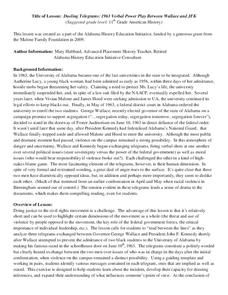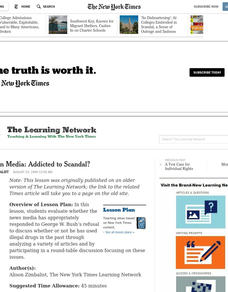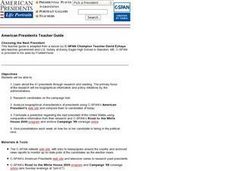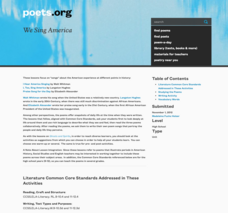HISTORY Channel
The American Presidency Grades 7-9
As part of a study of the American Presidency, groups investigate five topics: Campaigns and Elections, Role and Responsibilities, Life in the White House, Assassination and Mourning, and Communicating the Presidency.
Curated OER
George Washington: The President Without Precedent
Students explore time period and events surrounding George Washington's inauguration, demonstrate how Washington set precedent for each action he took as American Republic's new president, and compare and contrast traditions and events...
Curated OER
Native Americans
Students choose two photographs and explain how they illustrate traditional Native American culture. They discuss how traditional Native American culture has been affected by two specific actions of the United States Government, (they...
PBS
Latino Americans: Timeline of Important Dates
From 1500-2000, an interactive timeline details important events related to Latino Americans. Next, to each date are small, yet informative blurbs—some of which include videos.
Constitutional Rights Foundation
Naturalized Citizens and the Presidency
Article II, Section 1 of the U.S. Constitution takes center stage in a lesson plan that asks class members to assume the role of state senators, debate a resolution to amend the U. S. Constitution to permit naturalized citizens to run...
Curated OER
The American Flag
Students examine the history and origin of the United States Flag. They identify each symbol and discover the proper way to display it. They discuss how the flag itself has played a part in recent events.
Curated OER
Nov. 17, 1973 | Nixon Declares 'I Am Not a Crook'
Connect events of the past to events of today. Budding historians read an eight paragraph passage describing the Watergate scandal. They then connect the Nixon scandal to sex scandals of recent times. There are six critical thinking...
Alabama Department of Archives and History
Conflict in Alabama in the 1830s: Native Americans, Settlers, and Government
To better understand the Indian Removal Act of 1830, class members examine primary source documents including letters written by Alabama governors and the Cherokee chiefs. The lesson is part of a unit on the expansion of the United...
Curated OER
Students Directed Learning
Students engage in a lesson which facilitates their learning about the history of the American presidency. They create their own lessons based on C-SPAN's American Presidents Timeline poster.
Alabama Department of Archives and History
Dueling Telegrams: 1963 Verbal Power Play Between Wallace and JFK
Information, inferences, and innuendos. Text and subtext. Class members examine telegrams exchanged between President John F. Kennedy and Alabama Governor George Wallace, studying both what is stated and what is implied by the diction...
Curated OER
The Brief American Pageant: The American People Face a New Century
The political landscape of Y2K is the focus of this series of slides, which cover the later years of the 20th century. Charts detail the poverty and social welfare rates in the 20th century, as well as a pie graph displaying the sources...
Curated OER
President Bush's Decision Points: Torture & the Rule of Law
Students explore terrorist interrogation issues. In this human rights lesson plan, students read articles and documents related to torture in terrorist investigations. Students respond to discussion questions regarding the articles....
Curated OER
Cartoons for the Classroom: Obama as the New Sisyphus
Reveal how Greek Mythology can play into American politics through this political cartoon, where President Obama is depicted as Sisyphus. Background information gives scholars access to the cartoon's context, and three talking points...
Curated OER
Cartoons for the Classroom: 2008 Presidential Primaries
Take a trip back in time with this political cartoon analysis worksheet, which has scholars reading background information on the heated 2008 primary campaign to help them approach two political cartoons. Three talking points (or writing...
Curated OER
American Media: Addicted to Scandal?
Students examine media coverage of George W. Bush's refusal to answer questions regarding past illegal drug usage in the 1999 campaign. They consider the role of rumor, scandal, audience and relevance in political media coverage.
Curated OER
Choosing the Next President
Students use comparative Internet research to formulate a prediction regarding the next president of the United States. They give presentations each week on how his or her candidate is faring in the political race.
Curated OER
Cartoons for the Classroom: The Bush and Clinton Years
Examine how the Bush and Clinton years are an example of political dynasties. This cartoon provides a way to explore the concept and activate critical thinking skills in order to better grasp U.S. Politics. A fun and educational way to...
Curated OER
Hindsight is 20-20Presidential First 100 DaysPresentation
Students interpret historical evidence presented in primary and secondary resources. For this American history lesson, students research the first 100 days of several American Presidents. Students use their research findings...
Curated OER
Shame on You!
Should public humiliation be an acceptable consequence for a crime? Have your middle schoolers engage in a round table discussion about the recent resurgence of the use of public humiliation as a punishment for crimes in the United...
Curated OER
Know Your Presidents
Students research and are able to identify the presidents placing them in chronological order.
Curated OER
Modern Iran (1951 - Today)
Introduce your class to the often-mysterious world of Iran in this informative and engaging presentation. With political, social, and religious upheavals, Iran's recent history is a hot topic in recent news - as is its future. After this...
K12 Reader
What's the Purpose? FDR's Pearl Harbor Speech
FDR's December 7, 1941 address to the nation is the focus of a reading comprehension exercise that asks middle schoolers to read an excerpt from the Pearl Harbor speech and determine the president's purpose.
Academy of American Poets
We Sing America
Pair the famous poems "I Hear America Singing," by Walt Whitman, and "I, Too, Sing America," by Langston Hughes, with a more recent poem by Elizabeth Alexander called "Praise Song for the Day" to demonstrate a theme and introduce your...
John F. Kennedy Presidential Library & Museum
Red States/Blue States: Mapping the Presidential Election
Young historians investigate how voting patterns have changed by comparing the outcome of the 1960 election to the outcome of the recent election. A creative final assessment has participants making a news show wherein they provide...

























